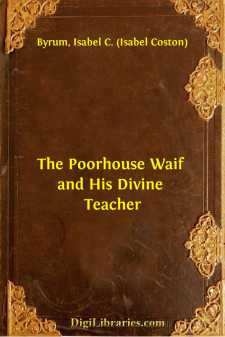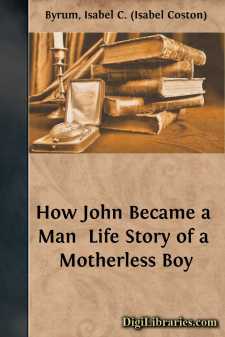Categories
- Antiques & Collectibles 13
- Architecture 36
- Art 48
- Bibles 22
- Biography & Autobiography 813
- Body, Mind & Spirit 142
- Business & Economics 28
- Children's Books 16
- Children's Fiction 13
- Computers 4
- Cooking 94
- Crafts & Hobbies 4
- Drama 346
- Education 46
- Family & Relationships 57
- Fiction 11829
- Games 19
- Gardening 17
- Health & Fitness 34
- History 1377
- House & Home 1
- Humor 147
- Juvenile Fiction 1873
- Juvenile Nonfiction 202
- Language Arts & Disciplines 88
- Law 16
- Literary Collections 686
- Literary Criticism 179
- Mathematics 13
- Medical 41
- Music 40
- Nature 179
- Non-Classifiable 1768
- Performing Arts 7
- Periodicals 1453
- Philosophy 64
- Photography 2
- Poetry 896
- Political Science 203
- Psychology 42
- Reference 154
- Religion 513
- Science 126
- Self-Help 84
- Social Science 81
- Sports & Recreation 34
- Study Aids 3
- Technology & Engineering 59
- Transportation 23
- Travel 463
- True Crime 29
The Poorhouse Waif and His Divine Teacher
Description:
Excerpt
CHAPTER I
THE DESERTED CHILD
In this wide world the fondest and the best
Are the most tried, most troubled, and distressed.
—Crabbe.
"Why, woman, you are not thinking of leaving that child in this place for us to look after, I hope! Our hands are more than full already. You say that the child is scarcely a month old. How do you suppose that we could give it a mother's care? More than this, the board that governs the affairs of this institution has given us orders to accept no children under seven months of age whose mothers are not with them. So if we should take the child, as you say we must, you would be obliged to remain for that length of time, at least, to help us care for it."
It was August Engler, steward of the county poorhouse in one of the eastern counties of Pennsylvania during the sixties, that spoke these words, and the circumstance that called forth the language was the appearance and request of Mrs. Fischer, a well-dressed young widow. The latter had come to the poorhouse with the intention of leaving her infant child. To this plan Mr. Engler had objected unless she was willing to comply with the rules of the place.
Mrs. Fischer, the mother of three little children, had recently heard that her husband, a soldier in the Civil War, had been killed in battle, and immediately she had gone into deep mourning as far as her dress was concerned. The care of her family, however, she felt was too great a responsibility to assume alone, and she had decided that the best thing for her to do was to give her three small children away and that the sooner it was done the better it would be. It was not hard to find homes for the girl and the boy, but with baby Edwin it was different He was so young that nobody cared to be bothered with him, and although she had tried hard, she had not succeeded in finding him a home.
In her perplexity she rushed to the infirmary. So confident had she been that it would be the duty of this institution to help her out that she had not thought of asking the privilege of leaving her baby as a favor.
As steward and matron of the poorhouse, Mr. and Mrs. Engler did what they could to keep things going smoothly and in order, but the work was too large for them to handle it properly. At that early date no special place except the poor farm had been provided for the simple and the insane; so it was necessary to have several buildings, both large and small, to provide for the needs of the people.
In the building that was known as the poorhouse proper was the main office. It was here that Mrs. Fischer appeared. Several other rooms of importance were also in this building, such as the dining-room and some living-apartments, but the bakery and the kitchen were in a building just a short distance away. And there was still another building, a large brick structure close to the main building. This was used for the confinement of such persons as the insane and the unmanageable, and the doors and windows, as well as the transoms, on both the inside and the outside were secured by iron bars....





